Create a Marketplace: Costs, Features & Steps (2026)

The commercial niche has been an attractive opportunity for business owners for a millennium now so the desire to create a marketplace comes as no surprise. There are plenty of opportunities to be had within such an industry as well as many cautions to keep in mind in order to build a worthwhile offer.
In our expert guide, we will reveal how to build an online marketplace website that will stand the test of time touching on the most crucial points that define success. Here you will learn which types of marketplaces exist, what their core features are, the process of creation you can expect to endure and much more valuable information.
By the end of the read, you will find that creating an online marketplace is no easy undertaking but with the right approach you can stand tall against competitors like Aliexpress, Amazon and Airbnb. Let’s begin by defining what this kind of business actually means.
What is an online marketplace?
A marketplace is an online platform in which multiple third-party sellers present their products or services to end customers. The purpose of the marketplace is to connect buyers and merchants as well as facilitating transactions between them for purchases. Building such platforms requires efficient web development services to guarantee flawless functionality and an easy-to-use interface.
Marketplace website development has been a hot topic of discussion among business owners for many years since running such operations does not require to hold any actual goods or items. Aside from building a website, a marketplace can be a web application and/or a mobile application to broaden the scope of reach of potential users on each side.
In many ways, a marketplace platform replaces the traditional supermarket operating on a very similar model in which one place features many vendors’ products. Although online marketplaces have been around and popular for more than a decade now, there was an unmistakable surge of interest in them during the global pandemic with the demand remaining to this day.

So, where does this marketplace niche currently stand? To put this into perspective, as of the first quarter of 2024, Amazon generated total net sales of over £107,38 billion which is on £12 billion more than they generated in the same quarter last year. This goes to show that the consumer demand is certainly there as well as exponential growth and opportunity.
The only question that currently stands is how can a newly emerged marketplace business compete with industry giants such as Etsy, eBay, Airbnb and many others? Well, the answer is tricky and as you may have noticed the mentioned platforms all carry different purposes and operate on individual business models.
In our next sections, we will go over the many intricacies of making a marketplace website which will help you find the right footing in the niche and make informed decisions to reap maximum benefits from this type of site.
Types of online marketplaces
In order to paint a clearer picture of what a marketplace can be before you jump into making one yourself, we need to assess what types of such websites exist first. Here are some of the most widespread models to know about:
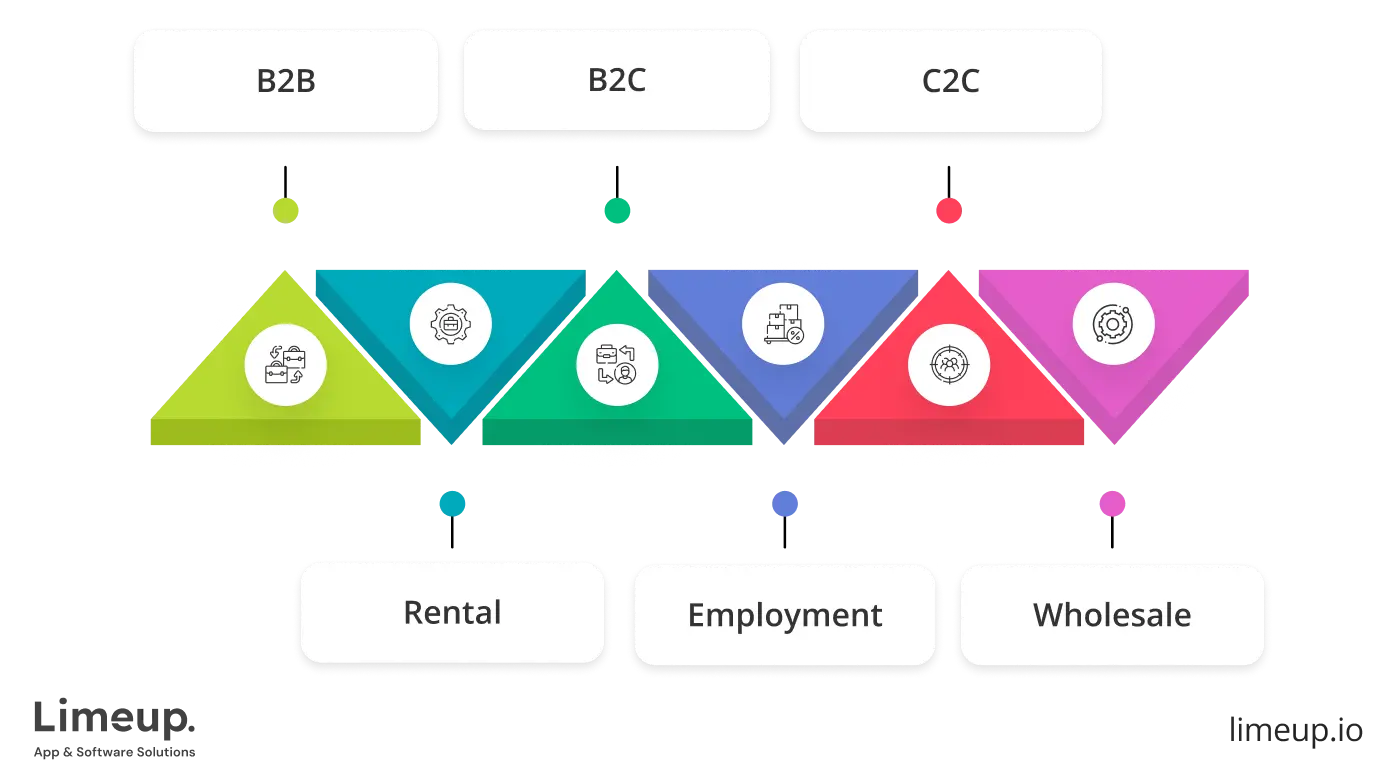
- B2B. Direct sales by businesses to other businesses are not a novel concept. One notable representative organization that uses this model is ThomasNet.
- B2C. This refers to a business-to-consumer transaction where building marketplaces relies upon connecting businesses with end customers and selling to each individual user. Amazon, launched in 1995, is a prime example, pushed to grow online commerce into a £784.580 trillion sector by 2024.
- C2C. Here, people trade goods with one another, frequently using auction elements. eBay, a now-dominant firm, popularized it when it was launched in 1995 to make room for customers to auction their things anywhere in the world.
- Rental. Websites like Booking.com and Airbnb are used to rent out properties. Thus, when it began operating in 2008, Airbnb revolutionized tourism with its access to millions of short-term rental options worldwide.
- Employment. Since 2015, job portals, such as Upwork, have changed the global job search and offering process by bridging the gap between employers and employees.
- Wholesale. Using this strategy, you can get in quantity for less money. This industry is dominated by giants like Alibaba and DHgate, with Alibaba alone bringing in £25.134 billion in sales in 2024.
As you can see, one specific marketplace can fall under more than one category which means your options are particularly vast. Choosing a specific model of operation will be generally dependant on the goals you are seeking to accomplish.
Why create an online marketplace?
There could be a plethora of reasons why business owners decide to launch their own marketplaces aside from it being an attractive opportunity. For existing retail stores, it can be a way to scale the corporation and attract larger audiences to their product by being featured as a leading vendor amongst other sellers in different sectors.
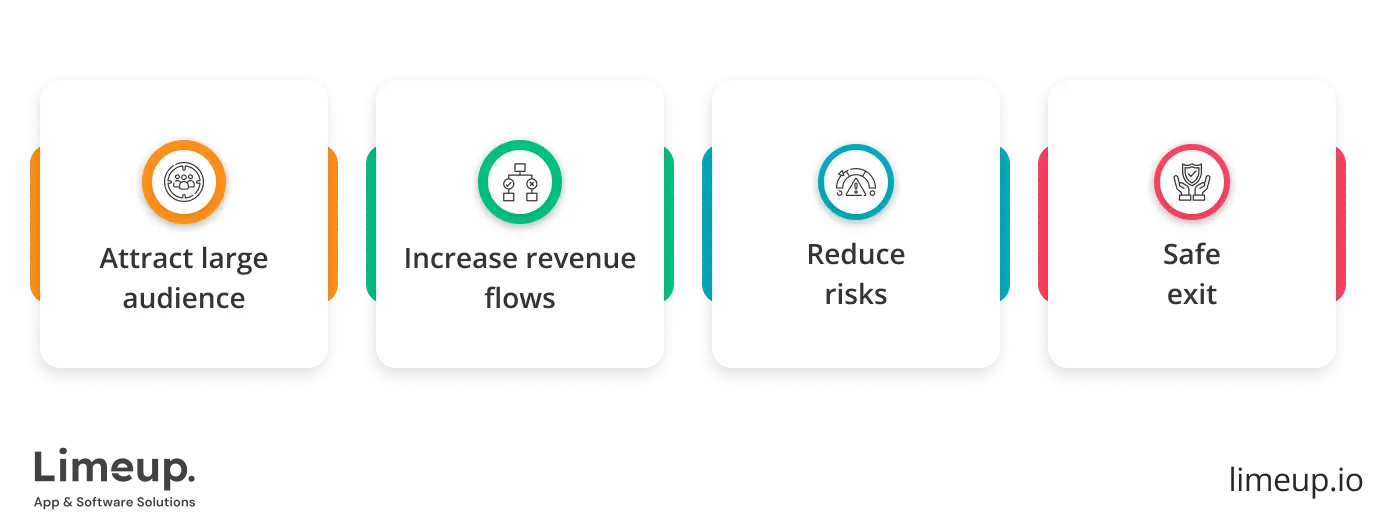
On the other hand for entrepreneurs without an e-commerce store, the capability to create your own online marketplace opens the prospect for increased revenue flows. There are a multitude of ways to monetize such a business and have a consistent and substantial profit from commissions and payments.
Into the bargain goes the attraction of reduced risks when operating due to the fact that the owner is not required to hold any actual inventory to start an online marketplace which leads them to remain only as a manager of the platform.
Last but not least compelling advantage is the potential for a safe exit in case the platform is no longer in the interest of stakeholders for whatever reason. A marketplace with an established name and a full base of an audience can become an attractive sales opportunity to other interested parties in the industry.
How to build an online marketplace website?
The first step in creating a successful marketplace website is to guarantee that your idea is in real demand and is also an industry gap filler. The market for Amazon or eBay-type platforms is already satisfied and hence, copying these sites hardly works every time.
A proper methodical approach would be very helpful in distinguishing not only the areas of improvement in the current solutions but also the new areas of solutions’ existence. If your business idea is still nebulous, then getting help from seasoned business analysts can be really beneficial.
Once your idea is solidified, you are set to develop a marketplace website.

Conduct market and user research
Initially, discover the market gaps that your innovation will cover. Then, pick the marketplace type that suits your segment the most, and note down your website specs. A proficient coding team should be the one to do the market and user research to approve your thoughts and to make sure the concept is in tune with the potential users.
Design UI and UX for an online marketplace
With validated research, your team can create the UI and UX design of the marketplace. Focus on usability, navigation, and clear interaction flows to provide a seamless experience for both buyers and sellers. Testing early prototypes helps catch issues and improve the design before development begins.
Build a marketplace MVP
After the research is confirmed, your group can move on to making the UI and UX design of the marketplace. Make sure the design is user-friendly, the navigation is easy, and the interaction flows are very clear so that both buyers and sellers can enjoy a seamless experience.
Early prototype testing is very helpful in identifying problems and making the design better before the actual development begins.
Develop full marketplace functionality
If the MVP is doing well, you can finish up the whole set of features you have planned. Your developers will start with the core functionalities, then payment gateways integration, and finally, the provision of user management, analytics, and other essential services through the installation of tools.
Test and launch your marketplace website
Prior to launching, perform thorough quality assurance testing to make sure the system is reliable, performs well, and is secure. After the testing is over, go ahead and launch your marketplace, then concentrate on providing support and maintenance to the user.
A continuous marketing approach, good incentives and updates are required for a loyal user base but with a strong, market-fit platform and a team with good technical skills, these efforts will be a lot easier.
After you build a marketplace platform your priority becomes sustaining it and keeping it afloat throughout the years. Growing a loyal net of customers on either side is undoubtedly hard work which requires putting effort into strategic marketing and advertising as well as implementing incentives that make your users want to come back again.
Still, those aspects are an entirely different conversation and what you do need to keep in mind is that sustaining efforts are going to be easier by a mile with a solid foundation of a market-fit solution and trustworthy technical specialists by your side.
How to attract sellers and buyers to your marketplace?
The main way to start with a good working setup for a marketplace is to have a plan for the recruitment of both the sellers and the buyers. Here’s how to achieve that:

Attracting sellers:
- Comprehensive tools. During the development stage, pay attention to crafting features aimed at making the lives of merchants easier, such as inventory and order management, analytics, messaging systems and so on.
- Affordable entry. As you are growing and building a marketplace platform, you should provide lower entry fees such as reduced rates of subscriptions or memberships for the first month of joining.
- Promotion opportunities. Integrate built-in SEO options so that the sellers can attract natural traffic and obtain a higher ranking in the search engine results.
Attracting buyers:
- Сustomer experience. Your marketplace should be easy to navigate, exciting to look at as well as cover users’ needs like competent customer support, various payment methods, etc.
- Product variety. Once you have a solid base of sellers on your platform, consumers will be intrigued by a multitude of choices to pick from and even compare competitive pricings if you include such a feature.
- Advertisement and marketing are unlikely to be avoidable and should be factored into your strategy as you aim to create your own marketplace. It is a tried-and-true method that brings tangible results if applied properly and professionally to reach a wide pool of potential users and get your name out there.
Using these tips you are sure to find success in bringing a large audience on board from either side.
Essential features for an online marketplace website
Touching on the point of the necessary features and functionality of a well-built platform for a marketplace you need to have a precise understanding that they are numerous. It can be a lengthy list if we include every single thing you have to implement for a properly operational website.
In order to make this subject 100% complete, you need to partner with a reliable development company and establish a full plan of action for your solution. For now, we can overview the five essential features your marketplace can’t go without.
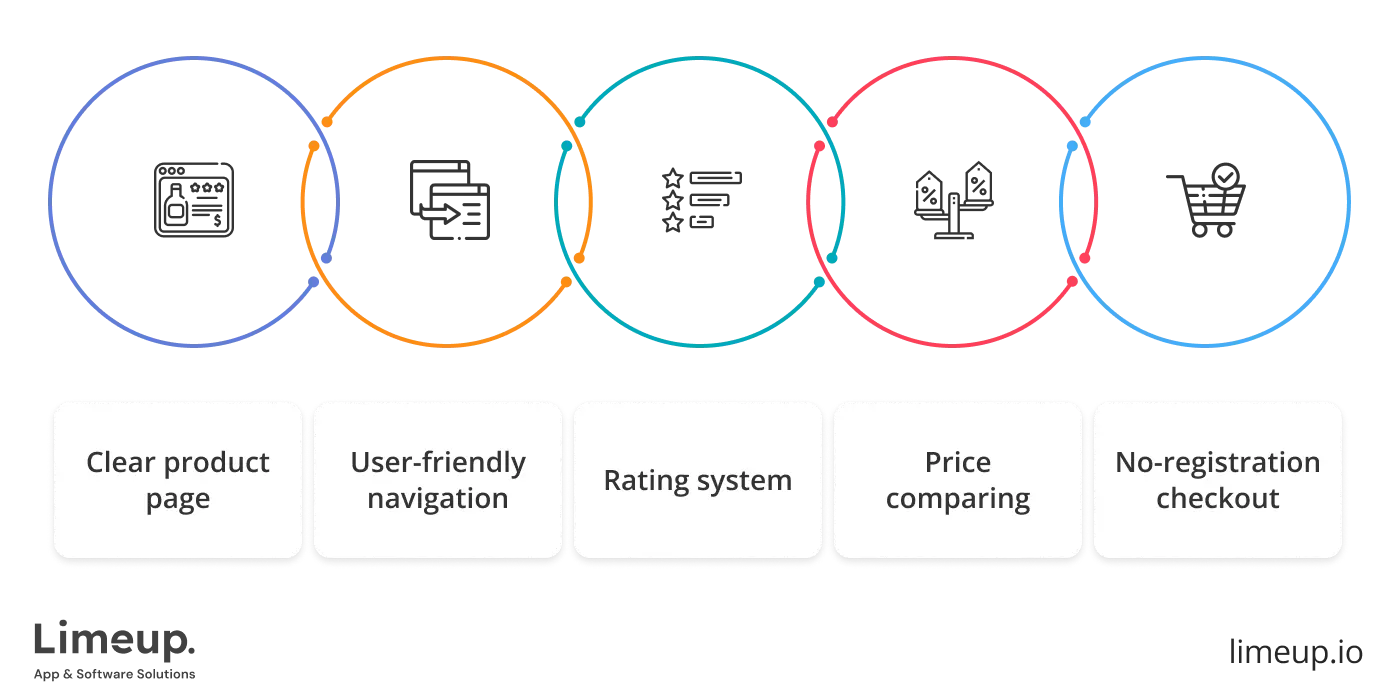
Clear product pages
If you want to know how to start an online marketplace then you should definitely prioritize complete yet easy-to-follow product pages as customers are going to be spending a lot of time there. The interface should not be distracting from the main points of the description and has to feature high-quality imagery so that buyers can scrutinize the item in detail.
User-friendly navigation
Marketplaces are like large stores where it can be easy to get lost in the abundance of choices. Focus on creating an intuitive information architecture that separates content into logical categories as well as develop navigation through a fully functional search bar, preferably with autocomplete sentences to maximize the experience.
Rating system
The ability to rate the sellers and the individual products is a great way to build a rating system that lets other customers know how reliable or, conversely, unpreferred a certain merchant is. Typically, it presents as a 1 to 5 star rating with a comment section which lets users detail their experience. Be sure to add the ability for buyers to post pictures of the products since customer-generated content is proven to be effective.
Price comparing
Including a feature that makes it feasible for price comparison is one way to establish a competitive market. Think about creating software that compiles costs for a given product from several vendors and presents them in a particular feature so consumers can select the most economical choice.
Checkout without registration
This functionality is especially valuable for buyers who are using your website for the first time and are not yet convinced to sign up. You can offer a so-called guest checkout that lets them add items to the cart, enter their personal information and checkout without becoming a part of the platform.
Remember that these are only the basics of a good marketplace platform and only scratch the surface of the variety of features you are going to develop. For example, other ones you need to keep in mind are mobile responsiveness, accessibility, customer support, etc.
How much does it cost to create a marketplace?
The price of developing any kind of website or software is notoriously hard to predict without taking a look at the requirements of the project first. This is due to the fact that the total cost depends on a wide variety of aspects a lot of which you are able to control.
The most influential factor is, of course, the scope of work that needs to be done to deliver the entire solution from strategy to deployment. For example, if you want to opt for a completely custom user interface and user experience design it is going to cost more as opposed to choosing pre-made templates and existing UI kits to create an online marketplace website.
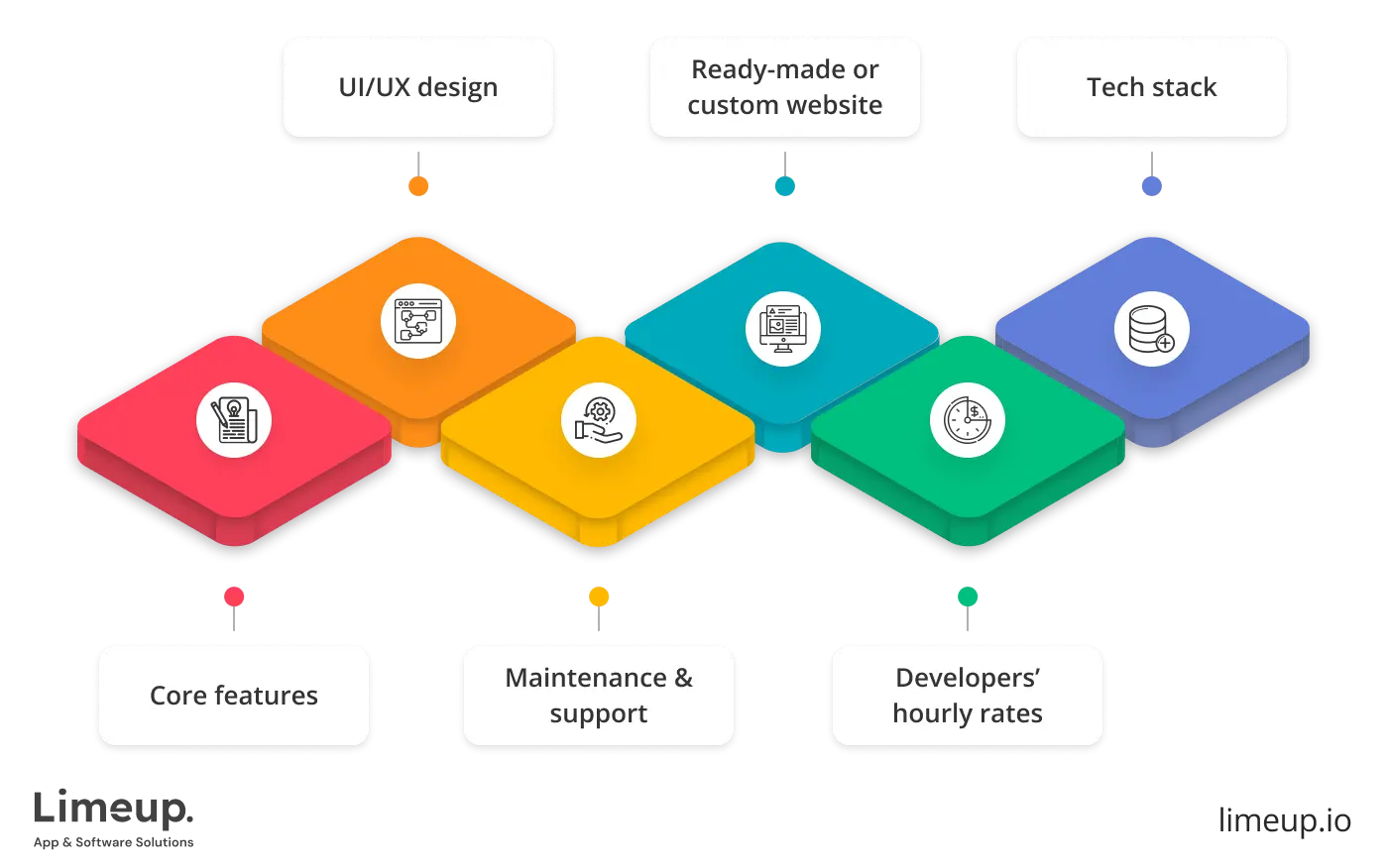
The same goes for the development of the main and secondary functionalities since you can either choose no-code practices and website builders or go with bespoke web development. In contrast, each of the options can be drastically different in their pricing. Payment integrations and other features can further influence the final quote based on how complex and extensive they are.
The decision to construct an MVP (minimum viable product) as your initial release to the market will ultimately come up, determining if you work with a development partner or employ an internal team. In order to test your idea with actual people and determine the market need before moving forward with a fully fledged development, this refers to constructing a web solution with just the essential and core features.
On the one hand, this option can save your money on investment initially and is generally a foolproof method of how to start a marketplace. On the other hand, you need to keep in mind that the development of an MVP is an additional cost on the entire project.
Regardless of the road you choose, you have to be mindful of your budget and pick development providers that fit you in terms of costs. Choosing between lower-end, boutique or higher-end web development companies in the UK can be a determining factor in whether you spend £20,000 to £50,000 for a custom marketplace or be willing to hand out £100,000+ for your project.
Issues that may arise while developing a marketplace website
It is not a surprise to anyone that starting any business carries its own set of risks and challenges. In order to be robust in overcoming such issues and even see them before they come, you have to familiarize yourself with the pitfalls that can lie ahead. So, here are the three most common difficulties you need to be aware of:
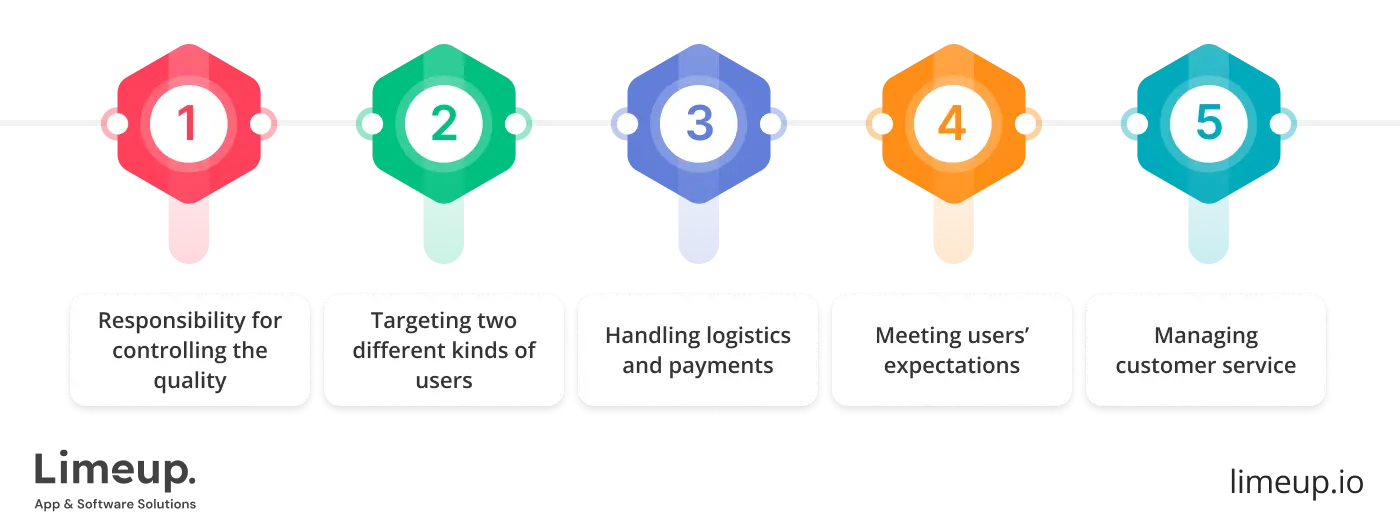
Responsibility for controlling the quality
No matter how you spin it, if you are determined to create a marketplace website that will truly be successful and not wishy-washy then overseeing and controlling the quality of the products sold on the platform as well as the sellers themselves is a must in your book. If that standard fails to be met, you are unlikely to accumulate customers.
A good practice involves checking the potential businesses who want to sell their items on your website to see whether their products are up to the standard and whether the third party is reputable with trustworthy reviews and records.
Targeting two different kinds of users
Since the question of how to build a marketplace and generate an audience is a two-sided battle you will be faced with the challenge of attracting contrasting types of users — merchants and buyers. After all, one cannot run without the other in this kind of business model.
Having a competent team of branding and marketing specialists by your side is an excellent way to mitigate the risks of failing to bring people in. Just like we talked about earlier, there are plenty of ways to get your marketplace’s name out there in an attractive light. Etsy’s recent marketing tool investments have culminated in a 20% rise in seller sales, demonstrating the positive impact of upgraded seller support.
Handling logistics and payments
Shipping and payment processing can feel like navigating through stormy seas on their own. In high-transaction markets, customer satisfaction hinges on getting these right. In order to accommodate your consumers’ demands, you will need to select reputable payment gateways and appropriate shipping partners.
A simple illustration of how well a company like Amazon has nailed this field is by enabling easy ways to pay and prompt shipping. Poor handling of a logistical issue will annoy customers and eventually damage the reputation of your business.
Meeting users’ expectations
This point is not only about how to launch a marketplace but also about maintaining a competitive advantage in the industry and your position in the market. We already mentioned the sheer necessity of finding the right spot to fill in the niche as well as focusing on engaging user experience.
On top of that you have to keep your hand on the pulse for current and emerging trends as the demands of consumers tend to rapidly change and you need to be able to cater to their expectations accordingly and in a prompt fashion. These kinds of focuses may seem trivial but in reality play a significant role in building a legacy out of your business.
Managing customer service
Regardless of the sector or speciality, customer service is the lifeblood of any marketplace. As your platform matures, the volume of questions and complaints will rise, necessitating excellent customer support. Adding chatbots to your website, hiring a knowledgeable support staff along with developing thorough FAQ pages are all practical methods for the enhancement of user experience.
Companies like Zappos have benefited greatly from the realization that providing fast customer service builds customer loyalty and is a surefire way to increase sales since its founding in 1999. Failing to pay attention to this aspect results to dissatisfaction and tarnishing of the credibility of the marketplace.
Looking to make a marketplace website?
Now that you have gotten acquainted with the ins and outs of what it means to launch your own website focused on selling goods or services, you can make informed decisions down the line. With every crucial detail you know so far it won’t pose such a challenge to pick the right type, establish features and take the right steps to start your own online marketplace.
Your greatest tools in this digital age will be inventiveness and agility because customer expectations are constantly changing. Keep in mind that the big players in the business did not get there overnight; rather, their success has been attributed to a thorough understanding of the markets and a dedication to providing value to users.
Reach out to our team of experts and schedule a free consultation for a more in-depth conversation as we are prepared to walk you through the plan for your idea and discuss how to turn your concept into reality.
FAQ
How long does it take to launch a marketplace website?
A marketplace website launch usually requires a time span of about 3 to 6 months, the precise duration being contingent upon the level of intricacy, the features that one wishes to include, and the choice of commencing with a Minimum Viable Product (MVP) as well.
What makes a marketplace different from an eCommerce store?
In contrast to a regular eCommerce shop that directly sells items, a marketplace serves as a bridge between various sellers and purchasers, thus functioning as a platform instead of a merchant. This entails the need for extra functionalities such as seller profiles, fee management, and consumer feedback.
How do online marketplaces usually make money?
Marketplaces earn their income by charging a percentage of sales, collecting listing fees, offering subscription plans for merchants, or providing premium features to customers. Additionally, some marketplaces rely on ad placements or transaction costs as their revenue sources to further enhance their financial performance.
What are the main risks of launching a marketplace?
Key risks include attracting both buyers and sellers, managing platform trust and security, ensuring smooth payment processing, and staying competitive in a crowded market. Early research, MVP testing, and strong technical support help mitigate these challenges.

